You also want an ePaper? Increase the reach of your titles
YUMPU automatically turns print PDFs into web optimized ePapers that Google loves.
CASE INFORMATION SHEET “RSK” (IT-95-11) <strong>MILAN</strong> <strong>MARTIĆ</strong><br />
<strong>MILAN</strong> <strong>MARTIĆ</strong><br />
“RSK” (IT-95-11)<br />
<strong>MILAN</strong><br />
<strong>MARTIĆ</strong><br />
Crimes convicted of (examples):<br />
Convicted of murder, persecutions on political, racial and religious grounds, cruel<br />
treatment, imprisonment, deportation, plunder of public or private property, wanton<br />
destruction of villages or devastation not justified by military necessity, torture,<br />
inhumane acts, attacks on civilians<br />
From 4 January 1991 until August 1995, held various leadership positions, such as<br />
President, Minister of Defence, Minister of Internal Affairs, in the so-called "Serbian<br />
Autonomous District (SAO) Krajina," and the so-called "Republic of Serbian Krajina"<br />
(RSK).<br />
- Sentenced to 35 years’ imprisonment<br />
Persecutions on political, racial and religious grounds, murder, imprisonment, torture, inhumane<br />
acts, deportation, inhumane acts (forcible transfers) (crimes against humanity)<br />
Murder, torture, cruel treatment, wanton destruction of villages or devastation not justified by<br />
military necessity, destruction or wilful damage done to institutions dedicated to education or<br />
religion, plunder of public or private property, attacks on civilians (violations of the laws or customs of<br />
war)<br />
• Milan Martić intended to forcibly displace the Croat and other non-Serb population from the SAO<br />
Krajina and the RSK, and he actively participated in the furtherance of the common purpose of the joint<br />
criminal enterprise (JCE). He actively worked together with the other JCE participants to fulfil the<br />
objective of a united Serb state, something which he expressed publicly on several occasions between<br />
1991 and 1995.<br />
• He was aware that the non-Serb population was being driven out as a result of the coercive<br />
atmosphere in the SAO Krajina and the RSK but he deliberately refrained from intervening against<br />
perpetrators who committed crimes against the non-Serb population.<br />
• He ordered the shelling of Zagreb on 2 and 3 May 1995 causing the death of seven persons and injuries<br />
to 214 others.<br />
Born 18 November 1954 near Knin, Croatia<br />
Indictment Initial indictment: 25 July 1995; amended indictment: 13 December<br />
2002; second amended indictment: 5 September 2003<br />
Surrendered 15 May 2002<br />
Transferred to <strong>ICTY</strong> 15 May 2002<br />
Initial and further<br />
appearances<br />
21 May 2002, pleaded not guilty to all charges ; 28 January 2003, pleaded<br />
not guilty<br />
1<br />
Document prepared by the Communications Service of the International Criminal Tribunal for the former Yugoslavia
CASE INFORMATION SHEET “RSK” (IT-95-11) <strong>MILAN</strong> <strong>MARTIĆ</strong><br />
Trial Chamber Judgement 12 June 2007, sentenced to 35 years’ imprisonment<br />
Appeals Chamber Judgement 8 October 2008, sentence affirmed<br />
Serving sentence 26 June 2009, transferred to Estonia to serve his sentence<br />
STATISTICS<br />
Trial days 143<br />
Witnesses called by Prosecution 45<br />
Prosecution exhibits 901<br />
Witnesses called by Defence 22<br />
Defence exhibits 90<br />
Chamber exhibits 24<br />
TRIAL<br />
Commenced 13 December 2005<br />
Closing arguments 10-12 January 2007<br />
Trial Chamber I Judge Bakone Justice Moloto (presiding), Judge Janet<br />
Nosworthy, Judge Frank Höpfel<br />
Counsel for the Prosecution Alex Whiting, Ana Richterova, Colin Black, Nisha Valabhji<br />
Counsel for the Defence Predrag Milovančević, Nikola Perović<br />
Judgement 12 June 2007<br />
APPEALS<br />
Appeals Chamber Judge Fausto Pocar (presiding), Judge Mohamed Shahabuddeen, Judge<br />
Mehmet Güney, Judge Andrèsia Vaz, Judge Wolfgang Schomburg<br />
Counsel for the Prosecution Michelle Jarvis<br />
Counsel for the Defence Predrag Milovančević, Nikola Perović<br />
Judgement 8 October 2008<br />
RELATED CASES<br />
<strong>MILAN</strong> BABIĆ (IT-03-72)<br />
GORAN HADŽIĆ (IT-04-75)<br />
SLOBODAN MILOŠEVIĆ (IT-02-54) “KOSOVO, CROATIA & BOSNIA”<br />
VOJISLAV ŠEŠELJ (IT-03-67)<br />
STANIŠIĆ & SIMATOVIĆ (IT-03-69)<br />
2<br />
Document prepared by the Communications Service of the International Criminal Tribunal for the former Yugoslavia
CASE INFORMATION SHEET “RSK” (IT-95-11) <strong>MILAN</strong> <strong>MARTIĆ</strong><br />
INDICTMENT AND CHARGES<br />
The initial indictment against Milan Martić was confirmed and made public on 25 July 1995. An amended<br />
indictment was filed on 18 December 2002, pursuant to the Trial Chamber decision of 13 December 2002.<br />
The second amended indictment was filed on 9 September 2003 (the indictment has a signature date of 14<br />
July 2003) pursuant to the Trial Chamber decision of 5 September 2003. The second amended indictment<br />
was re-filed by the Prosecution on 9 December 2005 to correct an error in pagination.<br />
The second amended indictment alleged that from 4 January 1991 until August 1995, Milan Martić held<br />
various leadership positions in the so-called Serbian Autonomous District (SAO) Krajina located in northeastern<br />
Croatia, which was later re-named the Republic of Serbian Krajina (RSK) and that, as such, Milan<br />
Martić participated in a joint criminal enterprise as a co-perpetrator. According to the indictment, the<br />
purpose of this joint criminal enterprise was the forcible removal of a majority of the Croat, Muslim and<br />
other non-Serb population from approximately one-third of the territory of the Republic of Croatia, and<br />
large parts of the Republic of Bosnia and Herzegovina, in order to make them part of a new Serbdominated<br />
state through the commission of crimes. Specifically, this occurred in the SAO Krajina and the<br />
city of Zagreb in northern Croatia, and in the Autonomous Region of Krajina (ARK) in northern Bosnia and<br />
Herzegovina, in particular in Bosanski Novi, Bosanska Gradiška, Prnjavor, and Šipovo.<br />
It was alleged that this joint criminal enterprise came into existence before 1 August 1991 and continued<br />
until at least August 1995, and that individuals participating in this joint criminal enterprise included<br />
Slobodan Milošević; Borisav Jović; Branko Kostić; Veljko Kadijević; Blagoje Adžić; Milan Babić; Goran<br />
Hadžić; Jovica Stanišić; Franko Simatović, also known as "Frenki"; Tomislav Simović; Vojislav Šešelj; Momir<br />
Bulatović; Radovan Stojičić, also known as "Badža"; Željko Ražnjatović, also known as "Arkan"; Radovan<br />
Karadžić; Momčilo Krajišnik; Biljana Plavšić; Momir Talić; Ratko Mladić and other members of the Yugoslav<br />
People’s Army (JNA), later the Yugoslav Army (VJ); the army of the RSK (SVK); the army of the Republika<br />
Srpska (VRS); the Serb Territorial Defence (TO) of Croatia, Bosnia and Herzegovina, Serbia and<br />
Montenegro; local and Serbian police forces (MUP forces), including the State Security Service (DB) of the<br />
Republic of Serbia, and Serb police forces of the SAO Krajina and the RSK commonly referred to as<br />
"Martić’s Police," "Martićevci," "SAO Krajina Police" or "SAO Krajina Milicija"; and members of Serbian,<br />
Montenegrin and Bosnian Serb paramilitary forces and volunteer units, including the "Wolves of Vučjak"<br />
who were trained by Milan Martić and Martić’s Police, and other political figures from the (Socialist)<br />
Federal Republic of Yugoslavia, the Republic of Serbia, the Republic of Montenegro and the Bosnian Serb<br />
leadership.<br />
In order for the joint criminal enterprise to succeed in its objective, Milan Martić worked in concert with<br />
or through several individuals named above. Each participant or co-perpetrator within the joint criminal<br />
enterprise played a role or roles that significantly contributed to the overall objective of the enterprise.<br />
Among other things, the indictment alleged that Milan Martić, acting individually or in concert with<br />
others, participated in the joint criminal enterprise in the following ways:<br />
• He participated in the creation, financing, supply, training and direction of “Martić’s Police”. These<br />
police forces were created and supported to assist in the execution of the joint criminal enterprise<br />
through the commission of crimes in violation of Articles 3 and 5 of the Statute of the Tribunal.<br />
• He participated in the creation, financing, supply, training and direction of Territorial Defence forces<br />
(TO) of the SAO Krajina and subsequently the RSK which participated in the crimes described in the<br />
indictment.<br />
• He participated in the creation, training and direction of special police forces of the Serbian State<br />
Security Service which participated in the crimes described in this indictment.<br />
• He personally participated in the military actions and subsequent crimes of these police and military<br />
forces.<br />
• He participated in the planning, preparation and execution of the take-over of territories in the SAO<br />
Krajina and RSK territory, and the subsequent forcible removal of the Croat, Muslim and other non-Serb<br />
population.<br />
3<br />
Document prepared by the Communications Service of the International Criminal Tribunal for the former Yugoslavia
CASE INFORMATION SHEET “RSK” (IT-95-11) <strong>MILAN</strong> <strong>MARTIĆ</strong><br />
• He openly espoused and encouraged the creation by violence of a homogeneous Serbian state<br />
encompassing the territories specified in the indictment and actively participated with his troops to<br />
achieve this end.<br />
• He planned and ordered the shelling attacks on Zagreb in May 1995.<br />
Milan Martić was charged on the basis of individual criminal responsibility (Article 7(1) and 7 (3) of the<br />
Statute of the Tribunal) with:<br />
• Persecutions on political, racial and religious grounds; extermination; murder; imprisonment;<br />
torture; inhumane acts; deportation; inhumane acts (forcible transfers) (crimes against humanity,<br />
Article 5)<br />
• Murder; torture; cruel treatment; wanton destruction of villages or devastation not justified by<br />
military necessity; destruction or wilful damage done to institutions dedicated to education or<br />
religion; plunder of public or private property; attacks on civilians (violations of the laws or customs of<br />
war, Article 3)<br />
PRE-TRIAL PROCEEDINGS - Rule 61:<br />
In certain instances, such as the Milan Martić case, where the Tribunal has been unable to obtain custody<br />
of an accused, it has proceeded under Rule 61 of its Rules of Procedure and Evidence. In such proceedings<br />
a full Trial Chamber examines an indictment and the supporting evidence in public and, if it determines<br />
that there are reasonable grounds for believing that the accused committed any or all of the crimes<br />
charged, confirms the indictment and issues an international arrest warrant. The latter is intended to<br />
ensure that the accused will be arrested if he crosses international borders. In addition, if the Prosecutor<br />
satisfies the Chamber that the failure to service the arrest warrant on the accused was due to the failure<br />
to execute an arrest warrant or refusal of a State to co-operate with the Tribunal, the Chamber may so<br />
certify. The President of the Tribunal, in consultation with the presiding Judges of the Trial Chambers,<br />
may then notify the Security Council of such failure or refusal by a State. A Rule 61 hearing is not a trial in<br />
absentia and does not provide for a finding of guilt.<br />
A Rule 61 hearing in the Milan Martić case was held on 27 February 1996, with Judge Jorda presiding. In<br />
addition to written evidence, the Prosecutor presented live testimony from four witnesses. On 8 March<br />
1996, the Trial Chamber issued a decision confirming the initial indictment and issuing an international<br />
arrest warrant for Milan Martić which was sent to all States and to the NATO-led Implementation Force<br />
(IFOR) that was in Bosnia and Herzegovina at the time.<br />
JOINDER PROCEEDINGS<br />
On 30 May, 1 June and 19 July 2005, the Office of the Prosecutor submitted three identical motions to<br />
join its cases against Milan Martić, Jovica Stanišić and Franko Simatović, and Vojislav Šešelj. All four<br />
accused filed responses to the motions.<br />
Rule 48 of the Tribunal's Rules of Procedure and Evidence provides that “[p]ersons accused of the same or<br />
different crimes committed in the course of the same transaction may be jointly charged and tried.” A<br />
“transaction” is defined in Rule 2 of the Rules as a “number of acts or omissions whether occurring as one<br />
event or a number of events, at the same or different locations and being part of a common scheme,<br />
strategy or plan.”<br />
If a Chamber decides that these requirements have been met, it may grant joinder or leave the cases to<br />
be tried separately. According to the Tribunal's case law, the following factors may be taken into account<br />
in making this determination: (i) promoting judicial economy; (ii) avoiding conflicts of interest that might<br />
cause serious prejudice to the accused; (iii) protecting the interests of justice, inter alia, by safeguarding<br />
the rights of the accused to a fair and expeditious trial; (iv) minimising hardship to witnesses, and (v)<br />
ensuring consistency of verdicts.<br />
4<br />
Document prepared by the Communications Service of the International Criminal Tribunal for the former Yugoslavia
CASE INFORMATION SHEET “RSK” (IT-95-11) <strong>MILAN</strong> <strong>MARTIĆ</strong><br />
In its decision of 10 November 2005, the Trial Chamber decided that the crimes alleged in the indictments<br />
of Milan Martić, Jovica Stanišić and Franko Simatović, and Vojislav Šešelj were indeed committed in the<br />
course of the “same transaction” and were therefore eligible to be “jointly charged and tried.” However,<br />
they also ruled that none of the other factors could be evaluated in favour of joining the three cases. The<br />
judges concluded that the factors of judicial economy and rights of the accused argued strongly against<br />
such a joinder because it would substantially increase the length of each accused’s trial and in Milan<br />
Martić’s case further delay its commencement. Accordingly, the Trial Chamber decided to refuse the<br />
request for joinder and to leave the three cases to be tried separately.<br />
THE TRIAL<br />
The Milan Martić trial commenced on 13 December 2005. The Prosecution completed its case-in-chief on<br />
20 June 2006. On 3 July 2006, the Trial Chamber issued an oral decision pursuant to Rule 98bis. The<br />
defence began presenting its case on 11 July 2006 and concluded on 16 November 2006. The closing<br />
arguments of the Prosecution were presented on 10 January 2007 and of the Defence on 10, 11 and 12<br />
January 2007.<br />
RULE 98bis DECISION<br />
After the conclusion of the presentation of Prosecution evidence, the Trial Chamber can rule whether<br />
there is a case to answer. If the Chamber believes that the Prosecution has not presented sufficient<br />
evidence to prove certain charges, it can dismiss those charges before the beginning of the presentation<br />
of defence evidence.<br />
On 3 July 2006, the Trial Chamber in the Milan Martić case issued an oral decision in which it stated the<br />
following: "...the Chamber is therefore of the view that there is no basis on which it can enter a<br />
judgement of acquittal pursuant to Rule 98bis..."<br />
TRIAL CHAMBER JUDGEMENT<br />
Milan Martić was sentenced to 35 years' imprisonment for crimes committed during the early nineties<br />
against Croats and other non-Serbs in Croatia. He was convicted on 16 counts of the indictment including<br />
persecutions, murder, torture, deportation, attacks on civilians, wanton destruction of civilian areas and<br />
other crimes against humanity and violations of laws and customs of war. He was acquitted on one count<br />
of the indictment charging him with extermination.<br />
On 21 December 1990 in Knin, the Serbian Autonomous Region (SAO) of Krajina was proclaimed by<br />
municipalities in the regions of Northern Dalmatia and Lika, in south-western Croatia. In January 1991,<br />
the SAO Krajina established a “Regional Secretariat for Internal Affairs” in Knin, and Milan Martić was<br />
appointed Secretary for Internal Affairs. The government of Croatia was informed that the Croatian<br />
Ministry of the Interior would no longer be considered as having authority within the SAO Krajina. On 27<br />
June 1991, Milan Martić was appointed Minister of the Interior of the SAO Krajina. On 19 December 1991,<br />
the SAO Krajina was replaced by the Republic of Serbian Krajina. Milan Martić continued as Minister of<br />
Interior.<br />
The Trial Chamber found that the evidence showed that the President of Serbia, Slobodan Milošević,<br />
openly supported the preservation of Yugoslavia as a federation of which the SAO Krajina would form a<br />
part. However, the evidence established that Slobodan Milošević covertly intended the creation of a Serb<br />
state. This state was to be created through the establishment of paramilitary forces and the provocation<br />
of incidents in order to create a situation where the JNA could intervene. Initially, the JNA would<br />
intervene to separate the parties but subsequently the JNA would intervene to secure the territories<br />
envisaged to be part of a future Serb state.<br />
During the spring and summer of 1991, armed clashes took place between Croatian and SAO Krajina armed<br />
forces in several areas. There were also raids and attacks by SAO Krajina police and other forces on<br />
several Croat-majority areas, including Lovinac, Ljubovo, and Glina.<br />
5<br />
Document prepared by the Communications Service of the International Criminal Tribunal for the former Yugoslavia
CASE INFORMATION SHEET “RSK” (IT-95-11) <strong>MILAN</strong> <strong>MARTIĆ</strong><br />
The evidence showed that the JNA intervened during these clashes in order to separate the two sides.<br />
However, this changed on 26 August 1991, when the JNA 9 th Corps participated on the side of the SAO<br />
Krajina’s Milicija Krajine and TO forces in an attack on the Croat-majority village of Kijevo, near Knin.<br />
The attack followed an ultimatum issued by Milan Martić, in which he stated that:<br />
“You and your leadership have brought relations between the Serbian and Croatian<br />
populations to such a state that further co-existence in our Serbian territories of the<br />
SAO Krajina is impossible”.<br />
The attack on Kijevo marked a turning point in the JNA’s role in the conflict in Croatia, and from that<br />
point, the JNA participated in attacks on majority-Croat areas and villages together with SAO Krajina MUP<br />
and TO forces. From August 1991 and into early 1992, these combined forces attacked several Croatmajority<br />
villages and areas, including Hrvatska Kostajnica, Cerovljani, Hrvatska Dubica, Baćin, Saborsko,<br />
Poljanak, Lipovača, Škabrnja and Nadin. The evidence showed that the attacks were carried out in order<br />
to connect Serb villages and areas across non-Serb areas. During these attacks, the crimes of murder,<br />
destruction, plunder, detention, torture, and cruel treatment were committed against the non-Serb<br />
population.<br />
The plan to link up Serb villages and areas continued throughout 1992 with various armed clashes and<br />
attacks, including the so-called “Operation Corridor”, which was a military operation aimed at linking the<br />
Croatian and Bosnian Krajinas with Serbia. RSK forces, under the command of among others Milan Martić,<br />
participated in this operation.<br />
The Trial Chamber was presented with considerable evidence of acts of persecution carried out against<br />
the non-Serb population. Widespread acts of murder and violence, detention and intimidation became<br />
pervasive throughout the RSK territory from 1992 to 1995. These acts were committed by RSK TO and MUP<br />
forces, and by the JNA, as well as by members of the local Serb population, and created such a coercive<br />
atmosphere that the Croat and other non-Serb inhabitants of the RSK were left with no option but to flee<br />
or to be forcibly deported by RSK forces. In this respect, the Trial Chamber took particular note of the<br />
evidence that the RSK MUP forces directed the non-Serb population to collection points from which<br />
transport was organised to areas under Croatian control. By 1994, the RSK was virtually entirely Serb.<br />
The Trial Chamber found that all crimes charged in the Indictment, with the exception of extermination<br />
under Count 2, were committed in the SAO Krajina and the RSK from August 1991 through 1995, including<br />
murder, imprisonment, torture, cruel treatment, destruction, including of buildings dedicated to religion,<br />
as well as plunder. However, the Trial Chamber stressed that there were incidents underlying the crimes<br />
charged for which the Trial Chamber did not find Milan Martić guilty.<br />
In relation to extermination, the Trial Chamber recalled that a minimum number of victims was not<br />
required and that the crime might be established by an accumulation of separate and unrelated killings.<br />
The Trial Chamber in particular considered the evidence that the killings charged were committed within<br />
a limited period of time and within a limited territory. However, having considered these factors, as well<br />
as the totality of the evidence surrounding the killing incidents charged as extermination, the Trial<br />
Chamber found that the crime of extermination was not committed on an accumulated basis in this case.<br />
The Trial Chamber found that with regard to Counts 3 to 14, and Count 1 insofar as it related to these<br />
counts, Milan Martić’s individual criminal responsibility was one of participation in a joint criminal<br />
enterprise pursuant to Article 7(1) of the Statute.<br />
The Trial Chamber found that from at least August 1991 the political objective to unite Serb areas in<br />
Croatia and in BiH with Serbia in order to establish a unified Serb territory was implemented through<br />
widespread and systematic armed attacks on predominantly Croat and other non-Serb areas and through<br />
the commission of acts of violence and intimidation. In the SAO Krajina and the RSK, this campaign of<br />
violence and intimidation against the Croat and non-Serb population was a consequence of the position<br />
taken by the leadership that co-existence with the Croats and other non-Serbs, in Milan Martić’s words,<br />
“in our Serbian territories of the SAO Krajina” was impossible. Thus, the implementation of the political<br />
objective to establish a unified Serb territory in these circumstances necessitated the forcible removal of<br />
the Croat and other non-Serb population from the SAO Krajina and RSK. The Trial Chamber therefore<br />
found beyond reasonable doubt that the common purpose of the joint criminal enterprise was the<br />
establishment of an ethnically Serb territory through the displacement of the Croat and other non-Serb<br />
population, as charged in Counts 10 and 11.<br />
6<br />
Document prepared by the Communications Service of the International Criminal Tribunal for the former Yugoslavia
CASE INFORMATION SHEET “RSK” (IT-95-11) <strong>MILAN</strong> <strong>MARTIĆ</strong><br />
The evidence established that the SAO Krajina and RSK leadership, including in particular Milan Martić,<br />
sought and received significant financial, logistical and military support from Serbia. The support came<br />
from the MUP and the State Security Service of Serbia, from the JNA and from the Republika Srpska in<br />
Bosnia and Herzegovina. Milan Martić stated that he “personally never ceased this cooperation” and that<br />
there was “good cooperation with the leadership of Serbia, notably the [MUP].” In fact, the relationship<br />
with Serbia was so close that the SAO Krajina police was mainly financed with funds and material from<br />
Serbia. The support from Serbia continued throughout the indictment period. One witness even described<br />
the Army of the RSK and the Yugoslav Army as one and the same organisation, only located at two<br />
separate locations.<br />
The Trial Chamber therefore found that among others Blagoje Adžić, Milan Babić, Radmilo Bogdanović,<br />
Veljko Kadijević, Radovan Karadžić, Slobodan Milošević, Ratko Mladić, Vojislav Šešelj, Franko “Frenki”<br />
Simatović, Jovica Stanišić, and Captain Dragan Vasiljković participated in the furtherance of the common<br />
purpose of the joint criminal enterprise.<br />
The evidence showed that Milan Martić’s contacts with other members of the joint criminal enterprise<br />
were close and direct. As a result, substantive financial, logistical and military support was rendered to<br />
the SAO Krajina and the RSK. Milan Martić actively worked together with the other participants to achieve<br />
the objective of a united Serb state, something which he expressed publicly on several occasions. This<br />
objective he achieved by the forcible removal of the non-Serb population. Milan Martić was one of the<br />
most important and influential political figures in the SAO Krajina and RSK governments. As Minister of the<br />
Interior, Milan Martić exercised absolute authority over the MUP, including the power to intervene on an<br />
individual level by appointing and removing chiefs of public security stations, as well as the authority to<br />
disband units.<br />
The Trial Chamber considered that the sheer scale of the widespread and pervasive crimes perpetrated<br />
against the non-Serb population must have rendered such crimes common knowledge. Crimes committed<br />
within the territory of the RSK were even discussed at RSK government sessions. The evidence also showed<br />
that Milan Martić and the MUP were informed by the United Nations Civilian Police of the multitude of<br />
crimes committed against non-Serbs. In fact, Milan Martić himself issued detailed instructions concerning<br />
the cooperation of the MUP with the United Nations Civilian Police. In addition, at a meeting in 1993 with<br />
Cedric Thornberry, the UNPROFOR Director of Civil Affairs, Milan Martić requested that Croats who wished<br />
to leave the RSK sign statements that no one had put pressure on them to leave. There was therefore<br />
absolutely no doubt that Milan Martić was aware that the non-Serb population was being driven out as a<br />
result of the coercive atmosphere and widespread acts of violence and intimidation in the SAO Krajina and<br />
the RSK.<br />
However, despite the overwhelming evidence of crimes committed throughout SAO Krajina and RSK<br />
territory, the Trial Chamber was only presented with evidence of a few examples where Milan Martić<br />
intervened to punish members of the MUP who had behaved in a criminal manner. The Trial Chamber<br />
could not but conclude that Milan Martić deliberately refrained from intervening against perpetrators who<br />
committed such crimes.<br />
The Trial Chamber found that the crimes perpetrated against the non-Serb population under Counts 3 to<br />
9, Counts 12 to 14, and Count 1 insofar as it related to those counts, were outside of the common purpose<br />
of the joint criminal enterprise. However, the Trial Chamber recalled that Milan Martić was aware that<br />
the non-Serb population was being subjected to widespread and systematic crimes, including murder,<br />
unlawful detentions, beatings while detained, and crimes against property, following the coercive<br />
atmosphere in the SAO Krajina and the RSK. The Trial Chamber considered that this atmosphere was<br />
created and sustained by the actions of Milan Martić and other members of the joint criminal enterprise.<br />
The Trial Chamber therefore found that the crimes found to be outside the common purpose of the JCE<br />
were foreseeable to Milan Martić. Furthermore, the evidence included only scarce reference to Milan<br />
Martić acting to take measures to prevent or punish such crimes. In fact, despite the overwhelming<br />
evidence of the scale and gravity of the crimes being committed against the non-Serb population, Milan<br />
Martić persisted in pursuing the common purpose of the joint criminal enterprise. Thus, the Trial Chamber<br />
considered it proven beyond reasonable doubt that Milan Martić willingly took the risk that the crimes<br />
which had been found to be outside the common purpose might be perpetrated against the non-Serb<br />
population. The Trial Chamber therefore found that Milan Martić incurred individual criminal responsibility<br />
pursuant to Article 7(1) of the Statute for Counts 3 to 14, and Count 1, Persecution, insofar as it related<br />
to these counts.<br />
7<br />
Document prepared by the Communications Service of the International Criminal Tribunal for the former Yugoslavia
CASE INFORMATION SHEET “RSK” (IT-95-11) <strong>MILAN</strong> <strong>MARTIĆ</strong><br />
The Trial Chamber found that Milan Martić’s responsibility for the attacks on Zagreb on 2 and 3 May 1995<br />
was most appropriately described as “ordering”, pursuant to Article 7(1) of the Statute. Other modes of<br />
liability were therefore not considered. In reaching this finding, the Trial Chamber considered the<br />
substantial evidence that Milan Martić from 1992 onwards considered attacking Zagreb as a response to<br />
Croatian attacks on the RSK. The Trial Chamber also considered Milan Martić’s repeated admissions in the<br />
media that he ordered the attacks, as well as the evidence that Milan Martić and Milan Čeleketić were not<br />
in favour of a peaceful solution to Operation Flash. Milan Martić was also present when Milan Čeleketić<br />
ordered the shelling of Sisak. The Trial Chamber considered the totality of the evidence established that<br />
Milan Martić was involved from the beginning in the RSK’s military response to Operation Flash.<br />
On 12 June 2007, the Trial Chamber rendered its judgement, convicting Milan Martić, on the basis of<br />
individual criminal responsibility (Article 7(1) of the Statute of the Tribunal), with:<br />
- Persecution (crime against humanity)<br />
- Murder (crime against humanity)<br />
- Murder (violation of the laws or customs of war)<br />
- Imprisonment (crime against humanity)<br />
- Torture (crime against humanity)<br />
- Inhumane acts (crime against humanity)<br />
- Torture (violation of the laws or customs of war)<br />
- Cruel treatment (violation of the laws or customs of war)<br />
- Deportation (crime against humanity)<br />
- Forcible transfer (crime against humanity)<br />
- Wanton destruction of villages, or devastation not justified by military necessity (violation of the laws or<br />
customs of war)<br />
- Destruction of wilful damage done to institutions dedicated to education or religion (violation of the<br />
laws or customs of war)<br />
- Plunder of public or private property (violation of the laws or customs of war)<br />
- Murder (crime against humanity)<br />
- Inhumane acts (crime against humanity)<br />
- Attacks on civilians (violation of the laws or customs of war)<br />
He was found not guilty of the following count:<br />
- Extermination (crime against humanity)<br />
Sentence: 35 years’ imprisonment<br />
Credit was given for 1855 days spent in detention.<br />
APPEALS CHAMBER JUDGEMENT<br />
On 12 July 2007, both the Prosecution and the Defence filed their notices of appeal against the<br />
judgement. The Prosecution filed its appeal brief on 25 September 2007.<br />
On 14 January 2008, the Defence filed a new notice of appeal. The final version of its appeal brief was<br />
filed on 5 May 2008.<br />
The appeals hearing took place on 25 and 26 June 2008.<br />
Milan Martić brought ten grounds of appeal against the Trial Judgement, requested a finding of not guilty<br />
or a re-trial on the basis of alleged errors of law and fact. The Prosecution presented one ground of<br />
appeal, asking for a revision of the sentence due to an alleged error of law.<br />
The Appeals Chamber dismissed nine grounds of Milan Martić’s appeal and accepted two sub-grounds of<br />
the fifth ground of appeal, reversing his convictions relating to specific alleged crimes committed in<br />
Benkovac, Cerovljani, Vukovići and Poljanak.<br />
In Milan Martić’s fifth ground of appeal, in relation to his conviction for crimes committed in Benkovac, he<br />
submitted that the Trial Chamber erred in making these findings because the evidence upon which the<br />
Trial Chamber relied was unsupported and uncorroborated. The Appeals Chamber noted that the<br />
Prosecution acknowledged that these convictions should be reversed for reasons of fairness as they did not<br />
8<br />
Document prepared by the Communications Service of the International Criminal Tribunal for the former Yugoslavia
CASE INFORMATION SHEET “RSK” (IT-95-11) <strong>MILAN</strong> <strong>MARTIĆ</strong><br />
form part of the case against Milan Martić. The Appeals Chamber therefore found that the Trial Chamber<br />
erred in convicting Milan Martić for crimes committed in Benkovac and reversed his conviction for Counts<br />
8 and 9 in respect of the crimes perpetrated against Ivan Atelj and Šime Čaćić in Benkovac, and Counts 7<br />
and 9 in respect of the crimes perpetrated against the three children detained in a kindergarten in<br />
Benkovac.<br />
Also in his fifth ground of appeal, Milan Martić alleged errors of fact in the Trial Chamber’s findings<br />
relating to the general requirements of Articles 3 and 5 of the Statute, the existence of the joint criminal<br />
enterprise, his participation in the joint criminal enterprise and the crimes committed in furtherance of<br />
the common criminal purpose of the joint criminal enterprise. In addition, Milan Martić also argued under<br />
various grounds of appeal that the Trial Chamber erred in failing to properly establish a link between him<br />
and the principal perpetrators of the crimes.<br />
The Appeals Chamber considered the Trial Chamber’s findings on the crimes for which Milan Martić was<br />
convicted as a participant in a joint criminal enterprise, to determine whether there was a sufficient link<br />
between the principal perpetrators of the crimes and Milan Martić. The Trial Chamber had considered that<br />
the JNA, the police and other Serb forces active on the territory of the SAO Krajina and the RSK were<br />
structured hierarchically and closely coordinated with each other. Furthermore, the Trial Chamber<br />
identified the plurality of persons participating in the joint criminal enterprise and found that Milan Martić<br />
particapted “willingly” in the JCE. Finally, the Trial Chamber explicitly found that the objective of uniting<br />
Serb areas was implemented “through widespread and systematic armed attacks…and through the<br />
commission of acts of violence and intimidation”. The Appeals Chamber found that, while it would have<br />
been preferable for the Trial Chamber to make an explicit finding that members of the joint criminal<br />
enterprise, when using these forces, were acting in accordance with the common plan, this omission did<br />
not invalidate the Trial Judgement. Such attacks could not have been implemented without the<br />
participation of forces under the JCE members’ control.<br />
Therefore, with regard to the crimes committed by the Milicija Krajine, the JNA, the TO, the MUP or a<br />
combination thereof in Hrvatska Dubica, Cerovljiani, Baćin, Burška, the JNA 9 th corps barracks in Knin, the<br />
old hospital in Knin and the Titova Korenica facility, the Appeals Chamber found that the Trial Chamber<br />
did not err in establishing the required link between Milan Martić and the perpetrators. Similarly, the<br />
Appeals Chamber found no error in the Trial Chamber’s finding that a sufficient link existed between the<br />
principal perpetrators and Milan Martić with regard to the crimes committed in Lipovača by Serb<br />
paramilitary forces, crimes committed in Škabrnja and Nadin, and Saborsko by a combination of JNA<br />
soldiers or TO soldiers or other units, and crimes of persecution and deportation committed by the JNA,<br />
the TO, the Milicija Krajine, the MUP, the armed forces or police officers of the SAO Krajina and the RSK.<br />
The Appeals Chamber dismissed this sub-ground of appeal in relation to these crimes.<br />
However, the Appeals Chamber found that the Trial Chamber erred in finding that the required link<br />
existed between Milan Martić and the principal perpetrators with regard to crimes committed in<br />
Cerovljani by armed Serbs from Živaja led by Nikola Begović, crimes committed in Vukovići and Poljanak<br />
by unidentified Serbs or soldiers, and crimes committed in Vukovići by a combination of JNA soldiers or TO<br />
soldiers and other units. With regard to these crimes, the Appeals Chamber found that a miscarriage of<br />
justice resulted and reversed Milan Martić’s convictions under Counts 1, 3, 4, 12 and 13 insofar as they<br />
related to these crimes. Judge Schomburg appended a separate opinion on the matter of joint criminal<br />
enterprise.<br />
The Appeals Chamber dismissed all other grounds of appeal by Milan Martić.<br />
The Appeals Chamber granted the Prosecution’s sole ground of appeal in which it claimed that the Trial<br />
Chamber erred in law when it found that persons hors de combat, i.e. soldiers who are incapable of taking<br />
part in the hostilities (for example because injured or detained), could not be victims of crimes against<br />
humanity. In support of this, the Prosecution argued that the definition of “civilians” when used in the<br />
context of crimes against humanity should not be limited to its definition under international<br />
humanitarian law but should also include other categories of people. While the Appeals Chamber<br />
considered that certain terms have been defined differently in international humanitarian law and<br />
international criminal law, the fundamental character of the notion of “civilian” in international<br />
humanitarian law and international criminal law weighs against giving them different definitions under<br />
Article 3 and Article 5 of the Statute. The Appeals Chamber therefore found that the definition of civilian<br />
9<br />
Document prepared by the Communications Service of the International Criminal Tribunal for the former Yugoslavia
CASE INFORMATION SHEET “RSK” (IT-95-11) <strong>MILAN</strong> <strong>MARTIĆ</strong><br />
contained in Article 50 of Additional Protocol I reflects the definition of civilian for the purposes of Article<br />
5 of the Statute and did not include people hors de combat.<br />
However, the Appeals Chamber noted that the relevance of the “civilian population” in Article 5 of the<br />
Statute is to the chapeau requirement that there be a widespread or systematic attack against a civilian<br />
population. There was nothing in the text of Article 5 of the Statute or previous authorities of the Appeals<br />
Chamber that required individual victims of crimes against humanity to be civilians. A person hors de<br />
combat may thus be the victim of an act amounting to a crime against humanity provided that all the<br />
other necessary conditions are met, including that the crimes occur as part of a widespread or systematic<br />
attack against the civilian population.<br />
The Appeals Chamber found that the Trial Chamber erred in law in this respect and had it not done so, it<br />
would have entered convictions under Article 5 for seven victims of murder (Count 3), about 26 victims of<br />
torture (Count 6), about 28 victims of inhumane acts (Count 7) and about 23 victims persecution (Count 1)<br />
for acts committed against victims who were hors de combat at the time of the commission of the<br />
offence. The Appeals Chamber found that all elements of these offences had been met in relation to<br />
these victims and entered convictions for these crimes, with the exception of those crimes committed in<br />
Benkovac, as Martić’s convictions for crimes committed there were reversed by the Appeals Chamber<br />
elsewhere in its judgement.<br />
Concerning the impact of its findings on sentencing, the Appeals Chamber noted that it allowed a number<br />
of Milan Martić’s sub-grounds of appeal under his fifth ground of appeal, as well as the Prosecutor’s sole<br />
ground of appeal. In light of this, the Appeals Chamber gave consideration to whether an adjustment in<br />
Milan Martić’s sentence was appropriate.<br />
The new convictions entered under Article 5 of the Statute served to reflect the full culpability of the<br />
accused. However, the Appeals Chamber found that these convictions related to underlying conduct<br />
already taken into account by the Trial Chamber when entering convictions under Article 3. In relation to<br />
the convictions reversed on appeal, the Appeals Chamber considered that these reversals had minimal<br />
impact on Milan Martić’s overall culpability in light of the remaining crimes for which he was convicted<br />
and the impact they had on the victims. The Appeals Chamber concluded that the reversals on appeal did<br />
not warrant a revision of sentence.<br />
On 8 October 2008, the Appeals Chamber affirmed the sentence imposed by the Trial Chamber and<br />
sentenced Milan Martić to 35 years’ imprisonment.<br />
On 26 June 2009, Milan Martić was transferred to Estonia to serve his sentence.<br />
10<br />
Document prepared by the Communications Service of the International Criminal Tribunal for the former Yugoslavia



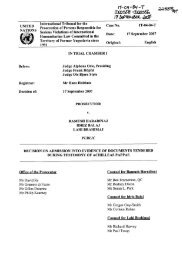
![utorak, 21.05.2002. 1 [Otvorena sjednica] 2 [Prvo stupanje ... - ICTY](https://img.yumpu.com/51523094/1/190x245/utorak-21052002-1-otvorena-sjednica-2-prvo-stupanje-icty.jpg?quality=85)
![sreda, 31.03.2010. 1 [Otvorena sednica] 2 [Optuženi su ušli u ... - ICTY](https://img.yumpu.com/51331326/1/190x245/sreda-31032010-1-otvorena-sednica-2-optua-3-4-eni-su-uali-u-icty.jpg?quality=85)
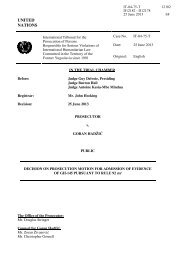
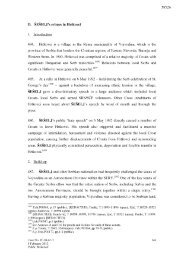
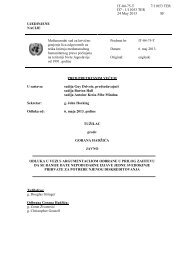
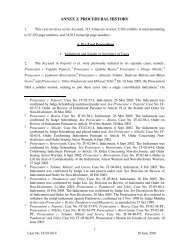
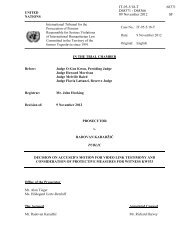
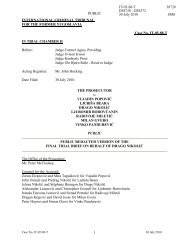
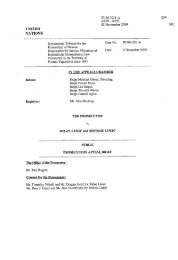
![petak, 03.11.2006. 1 [Otvorena sjednica] 2 [Optuženik je ušao ... - ICTY](https://img.yumpu.com/48534028/1/190x245/petak-03112006-1-otvorena-sjednica-2-optua-3-4-enik-je-uaao-icty.jpg?quality=85)
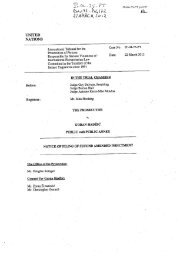
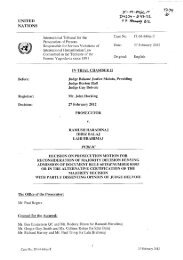
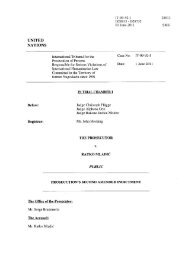
![petak, 11.07.2008. 1 [Otvorena sjednica] 2 [Optuženi su ušli u ... - ICTY](https://img.yumpu.com/47372453/1/190x245/petak-11072008-1-otvorena-sjednica-2-optua-3-4-eni-su-uali-u-icty.jpg?quality=85)